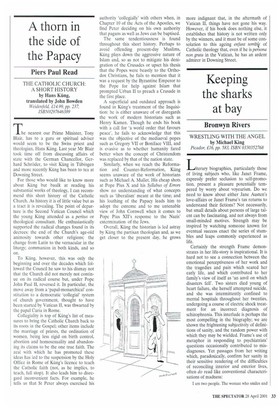A thorn in the side of the Papacy
Piers Paul Read
THE CATHOLIC CHURCH: A SHORT HISTORY by Hans Kiing, translated by John Bowden Weidenfeld, £14.99, pp. 237, ISBN0297646389 he nearest our Prime Minister, Tony Blair, has to a guru or spiritual adviser would seem to be the Swiss priest and theologian, Hans Kling. Last year Mr Blair took time off from discussing affairs of state with the German Chancellor, Gerhard Schroder, to visit Kung in Tubingen and more recently Kung has been to tea at Downing Street.
For those who would like to know more about Kling but baulk at reading his substantial works of theology, I can recommend this short history of the Catholic Church. As history it is of little value but as a tract it is revealing. The point of departure is the Second Vatican Council which the young Kiing attended as a peritus or theological consultant. He enthusiastically supported the radical changes found in its decrees: the end of the Church's age-old animosity towards other religions: the change from Latin to the vernacular in the liturgy; communion in both kinds, and so on.
To Kung, however, this was only the beginning and over the decades which followed the Council he saw to his dismay not that the Church did not merely not continue on its radical course but, under Pope John Paul II, reversed it. In particular, the move away from a `papal-monarchical' constitution to a democratic 'collegial' system of church government, thought to have been started by Vatican II, was thwarted by the papal Curia in Rome.
Collegiality is top of Kting's list of measures to bring the Catholic Church back to its roots in the Gospel; other items include the marriage of priests, the ordination of women, being less rigid on birth control, abortion and homosexuality and abandoning its claims to be the one true faith. The zeal with which he has promoted these ideas has led to the suspension by the Holy Office in Rome of Kting's licence to teach the Catholic faith (not, as he implies, to teach, full stop). It also leads him to disregard inconvenient facts. For example, he tells us that St Peter always exercised his authority 'collegially' with others when, in Chapter 10 of the Acts of the Apostles, we find Peter deciding on his own authority that pagans as well as Jews can be baptised.
The same tendentiousness is found throughout this short history. Perhaps to avoid offending present-day Muslims, Kiing plays down the aggressive nature of Islam and, so as not to mitigate his denigration of the Crusades or upset his thesis that the Popes were beastly to the Orthodox Christians, he fails to mention that it was a request by the Byzantine Emperor to the Pope for help against Islam that prompted Urban II to preach a Crusade in the first place.
A superficial and outdated approach is found in Kiing's treatment of the Inquisition: he is either unaware of or disregards the work of modern historians such as Henry Kamen. Though he ends his book with a call for 'a world order that favours peace', he fails to acknowledge that this was the objective of the mediaeval popes such as Gregory VII or Boniface VIII, and is evasive as to whether humanity fared better when the concept of Christendom was replaced by that of the nation state.
Similarly, when we reach the Reformation and Counter-Reformation, Ming seems unaware of the work of historians such as Michael A. Mullet. His cheap shots at Pope Pius X and his Syllabus of Errors show no understanding of what concepts such as 'liberalism' meant at the time; and his loathing of the Papacy leads him to adopt the extreme and to me untenable view of John Cornwell when it comes to Pope Pius XII's, response to the Nazis' extermination of the Jews.
Overall. Kung the historian is led astray by Kung the partisan theologian and, as we get closer to the present day, he grows
more indignant that, in the aftermath of Vatican II, things have not gone his way. However, if his book does nothing else, it establishes that history is not written only by the winners, and it must be of some consolation to this ageing enfant temb(e of Catholic theology that, even if he is persona non grata in the Vatican, he has an ardent admirer in Downing Street.


































































 Previous page
Previous page